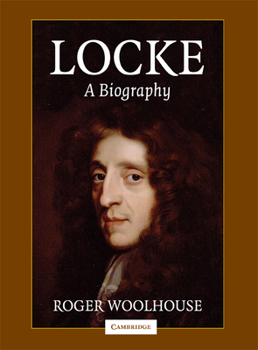Locke: A Biography
Select Format
Select Condition 
Book Overview
This is the first comprehensive biography in half a century of John Locke -"a man of versatile mind, fitted for whatever you shall undertake", as one of his many good friends very aptly described him. Against an exciting historical background of the English Civil War, religious intolerance and bigotry, anti-Government struggles and plots, and the Glorious Revolution of 1688, Roger Woolhouse interweaves the events of Locke's rather varied life with...
Format:Hardcover
Language:English
ISBN:0521817862
ISBN13:9780521817868
Release Date:January 2007
Publisher:Cambridge University Press
Length:558 Pages
Weight:1.90 lbs.
Dimensions:1.6" x 6.3" x 9.0"
Customer Reviews
3 ratings
a fascinating life
Published by Thriftbooks.com User , 15 years ago
John Locke's political philosophy resides in a strain that was ultimately to run through the thinking of the Founding Fathers of the American Revolution. His life is therefore at least as interesting as that of any 17th century man. Besides his intellectual contributions, Locke lived in interesting times, in youth through the English Civil War and in his age through the Glorious Revolution that presaged America's revolution. Woolhouse is a fine writer with depth of understanding of the period and of the copious primary sources (that include some of Locke's records of incidental expenses and even his laundry lists). He writes clearly about the development of the ideas in Locke's principal treatises, and provides a thorough description of his activities, almost month-to-month. This latter attribute of the work prompts me to knock a star from the rating to warn prospective readers that they may be in for a more detailed biography than they really want. For me slogging through a bit of detail is worth the effort to arrive at a clear picture of Locke, his influences and the era in which he lived.
Woolhouses's Engaging Biography Helps Us Better Understand Both Locke and the Heritage of Liberty
Published by Thriftbooks.com User , 15 years ago
Although Locke's philosophical arguments must stand or fall on their own merits, our knowledge of his life and times nevertheless enhances our understanding of those arguments. Fortunately, Locke was a regular correspondent and journal keeper, so scholars such as Woolhouse can reconstruct both major and minor episodes in his life and convey something of his character. Woolhouse does an excellent job of weaving all of these strands together to produce a comprehensive account that, perhaps surprisingly, is highly readable. Different sorts of readers look for different qualities in biographies. Woolhouse's book will appeal to many. Readers of a historical bent will be most interested in the exciting and dramatic events of the 1670s and 1680s that unfolded around Locke--the Whig/Tory conflict, the religious struggles, the Glorious Revolution, and the advent of William of Orange. It is difficult to overstate the significance of these events in British, Dutch, and French history for the later development of Europe and for how the North American colonies would evolve, and it is interesting to see them from Locke's perspective, sometimes as an observer and other times as a participant. Readers of a more philosophical bent will be interested in the development of Locke's thinking in its historical context--for example, how he reacted against Cartesian rationalism and came to develop his empiricist theory of knowledge, or how he came to incorporate the older natural-law tradition into a comprehensive theory of natural (that is, prepolitical) rights to life, liberty, and property.... Locke's contributions to epistemology, philosophy of mind, and theology are still staples of modern higher education, and his life would be worth studying in relation to any of these subjects. We feel his influence most strongly, however, in our political lives. When one studies Locke's political writings, their influence on the American revolutionaries eighty years later is obvious. By the 1770s, though, Lockean principles were no longer radical; they were commonly accepted because they had been the principles of the faction that emerged victorious in the English power struggle of the 1680s. So when Jefferson wrote, "We hold these truths to be self-evident," the declaration was a highly effective rhetorical flourish rather than a plainly false epistemological claim. If Lockean principles were widely accepted in England, then how could the English deny the logic of the colonists' position? The later development of a system of government predicated on natural-rights theory, as remarkable as it was, did not arise in a vacuum. It had antecedents in history. By studying these antecedents, we can understand our own times better. Because Locke was such a crucial figure in this story, Woolhouse has done us all a great service by producing this biography.
Well Balanced
Published by Thriftbooks.com User , 16 years ago
This is a fascinating biography of the great Locke. It is well balanced in details of both the life and movements of Locke, as well as providing some concise discussion on his various works. I was left the thought as to just how Locke's works may have developed if he, like all in his age, did not have the threat of religious politics breathing down his neck. I tend to believe he would have been a lot closer to Hume if he had both lived in Hume's age and had Hume courage ( and lack of political ambition!) A great biography that almost demands to be finished in one sitting.





